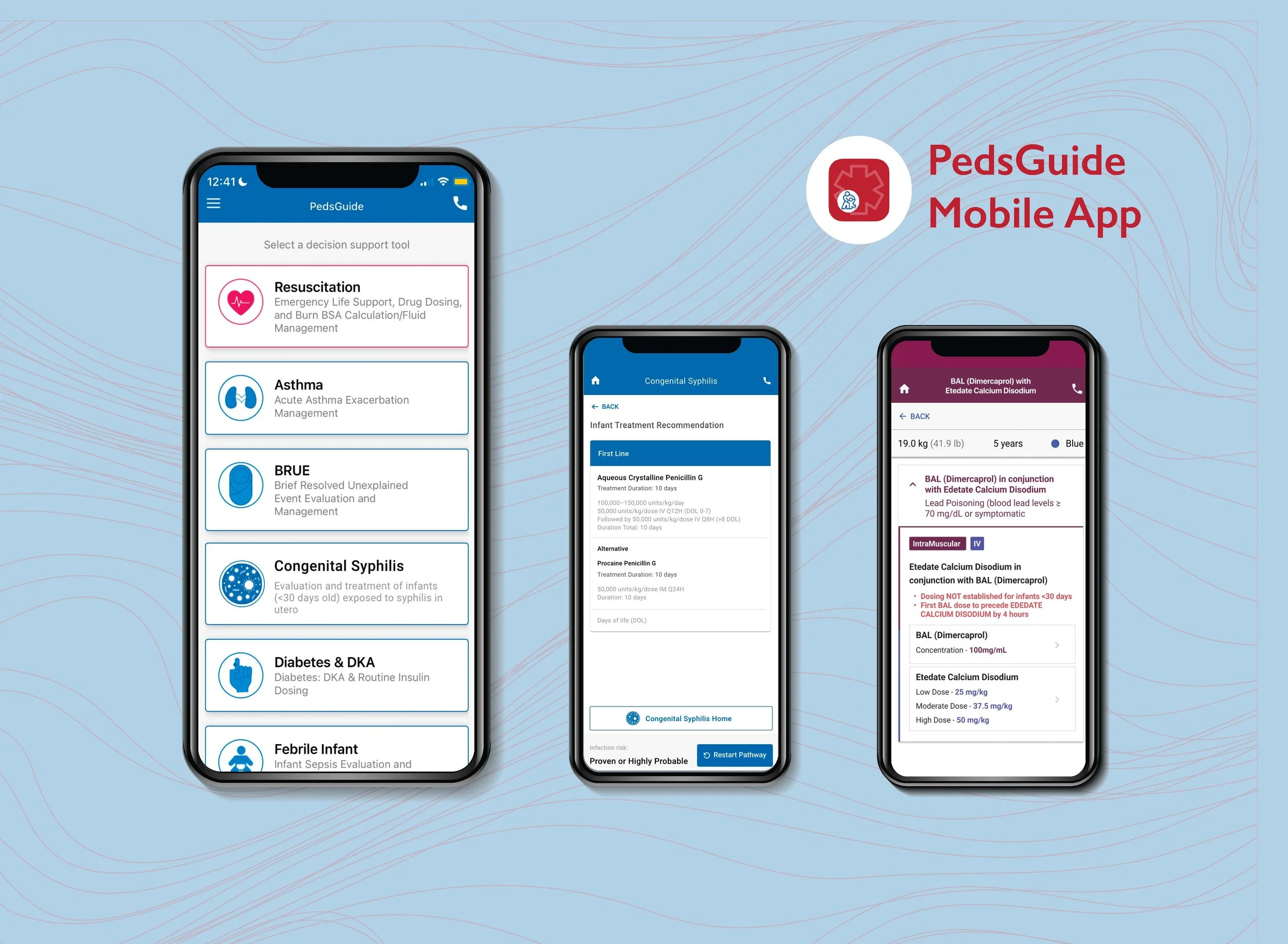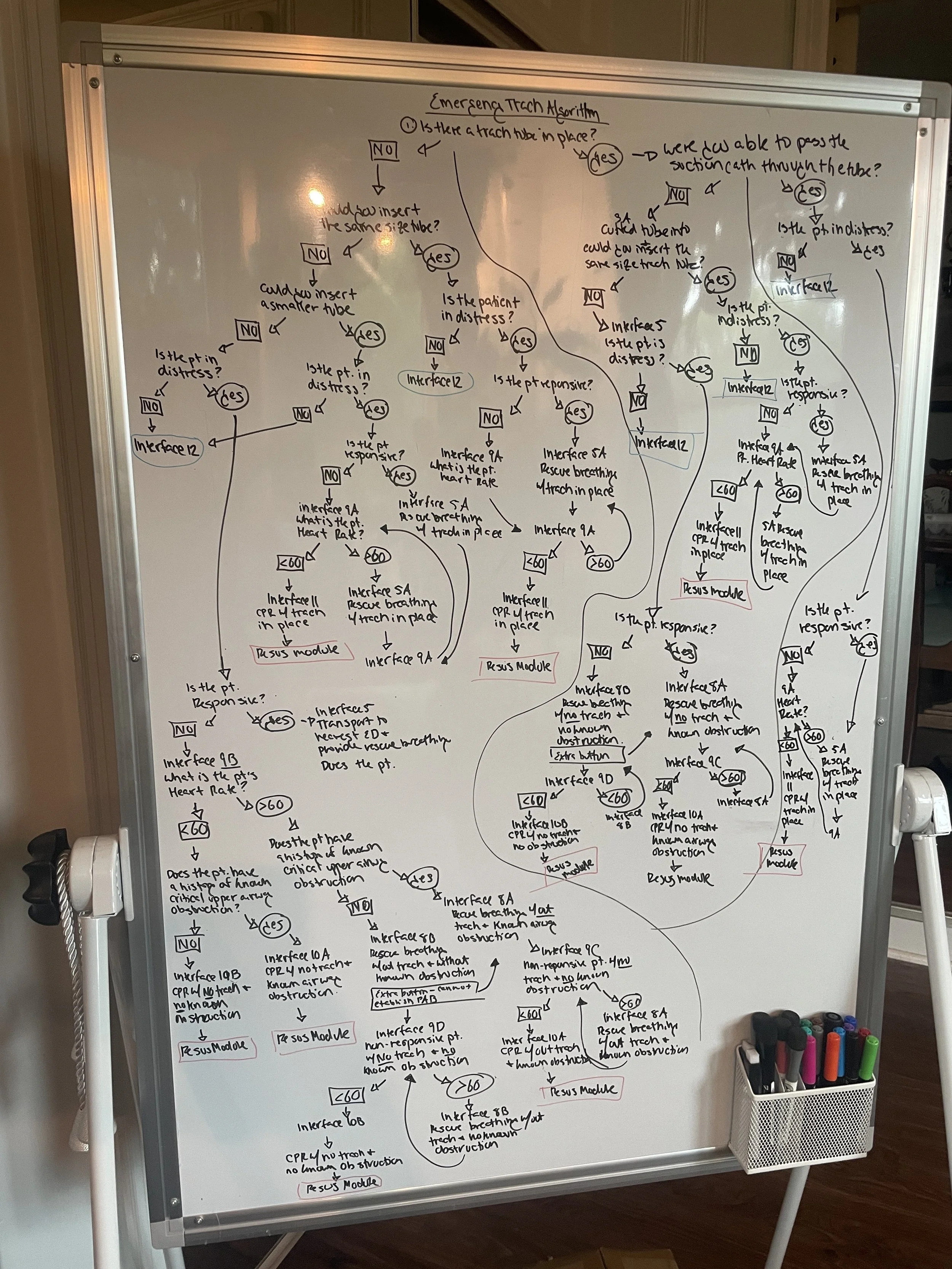
PedsGuide Mobile App: UX Intervention
Overview
PedsGuide is a mobile app designed to assist healthcare providers who (rarely) treat pediatric patients in emergency situations. These providers include, but are not limited to, EMS (emergency transport services - ambulances), primary care doctors, rural physicians, and anyone else who could have the opportunity to treat pediatric patients.
What is PedsGuide?
PedsGuide is a multi-module clinical decision support tool. Each module is a step-by-step interactive, clinical decision support tool, based on evidence-based practices.
PedsdGuide Growth
Before I joined Children’s Mercy (CM), PedsGuide was already in existence. However, over the last few years, the app has grown tremendously. An app that started with two, comprehensive, but straightforward modules, has grown to include over 11 modules, with more coming each day.
My Involvement
As PedsGuide has grown, more stakeholders want to create additional modules for the app. This is where I come in. While I am not a clinician, I work closely with CM medical staff to take complex medical algorithms and create easy to follow processes within the app.
The color pallet and other design aspects were already determined by a previous UX designer, but new modules always require new innovations, formats, and ideas. Since taking on PedsGuide, I have assisted in developing 9 modules, each with unique requirements and complex algorithms.
Roles
UX/UI designer, prototyper, idea generator, innovator, voice of reason
Duration
5+ years (2018 - present)
Design Challenges
Unfortunately, I do not have the space to go in depth on every module I have been a part of. However, I will go into my design process for a few of the modules I have been most recently involved in. The challenges for each of these modules was converting the stakeholder’s (clinical staff) vision and best clinical-practice guidelines into easy-to-access and easy-to-understand screens.
Modules I have been involved in (including those coming soon):
ADHD (Attention-Deficit/Hyperactivity Disorder - coming soon)
Antibiotics (coming soon)
Atopic Dermatitis
Autism
BRUE (Brief Resolved Unexplained Event Evaluation)
Congenital Syphilis (CS)
Drugs in Pediatric Emergencies
Head Injury
Seizure & Epilepsy (coming soon)
Tracheostomy Emergency Airway Management (coming soon)
Resuscitation
Design Process
Step 1: Define the Problem & Meet with Stakeholders
My process for each new module is the same. My first step is to meet with the stakeholder(s) and CM Innovation Team to discuss the plan, goals, deadlines, and focus on the main problem we are trying to solve.
Once we have a general outline of ideas, I am typically given a clinical algorithm to work from. I walk through the algorithm with the stakeholder at that first meeting, or series of meetings, until I feel I have a good understanding of the workflow.
I am the only designer on the team, so all of the creative responsibilities fall to me. Once the algorithm is given to me, I’m usually left to my own devices until I have a full first draft of the screen designs.
Step 2: Conduct Research
Since most of the background and technical research is completed by the clinicians for these modules, instead of conducting competitive analysis, creating personas, or writing surveys, I look into the background and evidence-based practice of the algorithm. For anything I do not know or understand from a medical perspective, I will use search engines and other medical resources (e.g., Red Book) to find the answers.
Step 3: Ideate
In this step, I will begin to plan for prototyping. This might involve sketching out ideas, reading the algorithm until it is forever burned in my brain, and re-familiarizing myself with the app design. Since I am already very familiar with the design of PedsGuide, this step does not usually take very long.
Sometimes, in this step, some clinicians will have attempted to make their own screens (in PowerPoint). I review those screens, make sense of them, and will (sometimes) use these screens (in addition to the algorithm) to create the first prototype of the module.
Step 4: Prototype
I finally get to open Figma (or in the case of the CS module, Adobe XD) and start putting my ideas into screens. This is usually the longest stage in my process, since the algorithms I work from are so complex. I take my time and ensure every question, paragraph, button, etc. are easy to read and intact.
Algorithm for CS module
How screens were oiriginally “designed” (in PowerPoint) by clinicians, for Head Injury Module
Ideation sketches for CS module
Algorithm and ideation for tracheotomy module
How screens are now designed (in Figma) since I joined, from the Emergency Drug Dosing module
Step 5: Deliver, Test, & Iterate
In this step, I ensure the screens I have created match the algorithm. I then walk through all the screens with the clinicians to ensure they are correct. If anything is incorrect, I’ll return to the prototyping step, until it is fixed. We go back and forth on this step for months (sometimes years), depending on the complexity of the algorithm and clinician's schedule.
Step 6: Hand Off
Once the screens are approved, the CM team holds a kick-off meeting with the development team (external to CM). During this meeting, I will walk through all the screens with the dev team, until they have a solid understanding.
Step 7: Iterate, Again
However, I am not done once the screens are handed off. During the coding process, the dev team will often come across questions not originally addressed by the stakeholders. As the dev process continues, I will create any new screens or update previous screens, as needed. This process continues until the module is complete and ready for QA (and then released).
Unfortunately, since healthcare is a very fluid, and an ever changing field, nothing in PedsGuide is ever, really complete. Algorithms or drug dosing rules may change over time, which keeps the CM team, me, and the dev team constantly on their toes.
Conclusion
PedsGuide is an ever changing app, and an iterative approach to this project is paramount. Through this work, we have produced a user-friendly app that meets pediatric healthcare providers' needs. Collaborating with healthcare professionals at CM has shaped the features of PedsGuide, and created an accessible resource that enhances care quality for pediatric patients.
PedsGuide - Congenital Syphilis Module
PedsGuide - Drugs in Pediatric Emergencies
PedsGuide - Antibiotics
PedsGuide - Atopic Dermatitis




